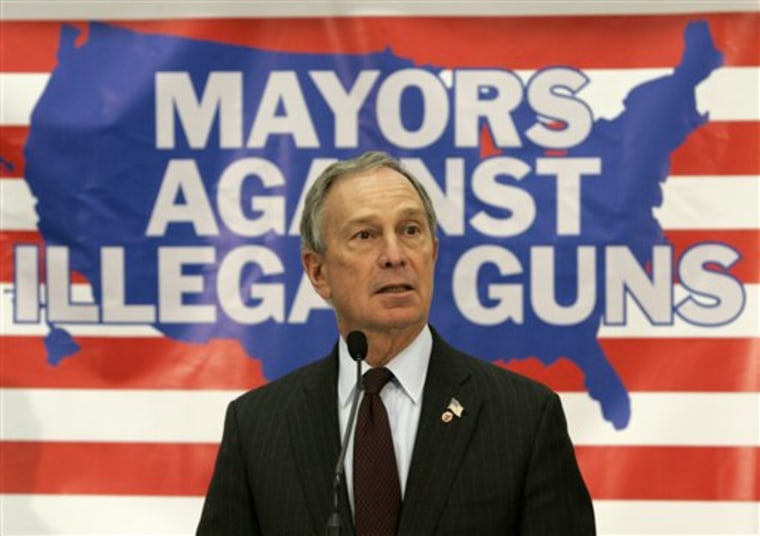When handguns with bullets that can pierce body armor showed up on the streets of New Jersey, Sen. Frank Lautenberg asked federal regulators to share data that could help local police figure out where the weapons were coming from.
That information, the New Jersey Democrat was told, is off-limits.
The amendment that bars such sharing of gun trace data has now touched off a feud between its sponsor, Rep. Todd Tiahrt, R-Kan., and a coalition of more than 200 mayors led by New York City Mayor Michael Bloomberg and Boston Mayor Thomas Menino.
Insisting that gun trace data is an essential crimefighting tool for cities, Bloomberg used his own funds as seed money, formed Mayors Against Illegal Guns and made repealing Tiahrt’s amendment its number one issue this year.
Tiahrt and Bloomberg met in Washington earlier this year to try to find a compromise. “I thought we were close,” Tiahrt said.
But when Tiahrt showed his proposed changes, “it was one step forward, three steps back,” said Bloomberg’s criminal justice coordinator, John Feinblatt.
‘You can’t get that information’
So last week, the mayors’ group began airing television ads against Tiahrt’s amendment in several media markets, including Tiahrt’s Wichita district — a step Tiahrt said went too far.
“I think that personal attack is something that’s very upsetting to me and very unjustified and a great mischaracterization of all my efforts here,” Tiahrt said.
Two TV stations in Wichita declined to air the ads, saying they could not verify the claims.
Tiahrt said his amendment, first passed in 2003 and typically attached to a major spending bill each year, is meant to protect sensitive information that, if shared with local police, could jeopardize active crime investigations.
Besides, he said, the Bureau of Alcohol, Tobacco, Firearms and Explosives has misinterpreted the amendment and tends to withhold more information than necessary.
Bloomberg’s aide countered that the amendment “makes police officers do their job with a blindfold on.”
“What you want to know is, for my jurisdiction, are there a small number of dealers who keep supplying crime guns to my city? And you can’t get that information,” Feinblatt said.
Under the Tiahrt amendment, local law enforcement agencies can obtain gun trace data from ATF if it concerns a specific criminal investigation or prosecution. But many police chiefs, mayors and their supporters in Congress say cities need access to ATF’s broader data to help fight crime.
‘This is like mayoral vigilantism’
In New Jersey’s case, Lautenberg said, Tiahrt’s amendment made it harder for police to identify trends in illegal gun trafficking, the types of guns criminals are getting, and which gun shops provided the weapons.
“We need to be able to identify where guns come from to combat gun violence and protect our communities,” Lautenberg said.
Tiahrt sees a political motive at work, noting that the use of trace data in lawsuits and other proceedings led to the revocation of some gun dealers’ licenses.
“They say they want the data to prevent crime, but they have no plan to use that data to prevent crime,” Tiahrt said. “I think perhaps what they want it for is to move a political agenda forward. A gun control agenda possibly.”
New York City has sued more than two dozen gun dealers nationwide, alleging they sold firearms illegally to undercover private investigators. Officials contend hundreds of weapons used in New York City crimes came from those dealers.
The movement to repeal the Tiahrt amendment has the backing of 10 law enforcement groups, including the International Association of Chiefs of Police, but not the Fraternal Order of Police, the nation’s largest law enforcement organization.
“This is like mayoral vigilantism,” said FOP executive director Jim Pasco. “It’s not their law to enforce. They go out like a bull in a China shop and wander around outside their jurisdictions trying to make civil cases. It’s absurd.”
When it first passed in 2003, Tiahrt’s amendment had the blessing of the powerful National Rifle Association. The NRA also has been Tiahrt’s fourth-largest contributor since he was elected to Congress in 1994, according to the Center for Responsive Politics.
‘Who the corrupt gun dealers are’
Paul Helmke, president of the Brady Center to Prevent Gun Violence, said part of the Tiahrt amendment’s goal is to protect gun manufacturers and gun dealers from lawsuits.
“With that background from ATF, you can learn who the corrupt gun dealers are and how they’re fueling the illegal trafficking in guns,” Helmke said. “Without that information, it’s a lot harder to do it.”
Since the federal assault weapons ban expired in 2004, Helmke said, some lawmakers want to know whether there has been a rise in crime committed with those firearms. Because ATF won’t release that data, they can’t find out.
Tiahrt claims the ATF could release some of its aggregate gun data and regional reports under his measure and that he plans to revise his amendment to make that clear.
As for Bloomberg, Tiahrt said, “I’m still committed to working with him if he has a problem with any criminal cases.”
